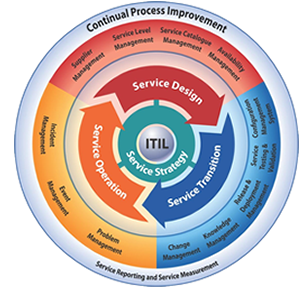 ITIL Service Transition
ITIL Service Transition
The objective of ITIL Service Transition is to build and deploy IT services. The Service Transition lifecycle stage also makes sure that changes to services and service management processes are carried out in a coordinated way.
As per ITIL 2011, the following main processes are part of the ITIL stage Service Transition:
- Change Management
Process Objective: To control the lifecycle of all Changes. The primary objective of Change Management is to enable beneficial Changes to be made, with minimum disruption to IT services.
- Change Evaluation
Process Objective: To assess major Changes, like the introduction of a new service or a substantial change to an existing service, before those Changes are allowed to proceed to the next phase in their lifecycle.
- Project Management (Transition Planning and Support)
Process Objective: To plan and coordinate the resources to deploy a major Release within the predicted cost, time and quality estimates.
- Application Development
Process Objective: To make available applications and systems which provide the required functionality for IT services. This process includes the development and maintenance of custom applications as well as the customization of products from software vendors.
- Release and Deployment Management
Process Objective: To plan, schedule and control the movement of releases to test and live environments. The primary goal of Release Management is to ensure that the integrity of the live environment is protected and that the correct components are released.
- Service Validation and Testing
Process Objective: To ensure that deployed Releases and the resulting services meet customer expectations, and to verify that IT operations is able to support the new service.
- Service Asset and Configuration Management
Process Objective: To maintain information about Configuration Items required to deliver an IT service, including their relationships.
- Knowledge Management
Process Objective: To gather, analyze, store and share knowledge and information within an organization. The primary purpose of Knowledge Management is to improve efficiency by reducing the need to rediscover knowledge.

